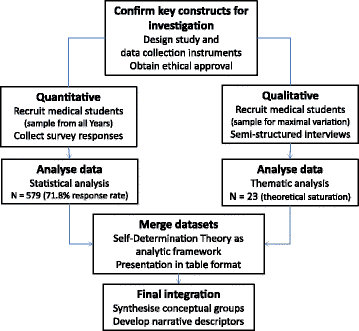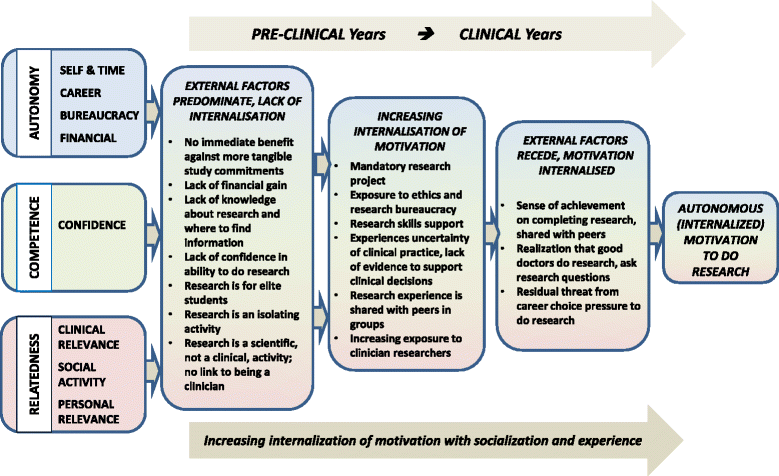Motivating medical students to do research: a mixed methods study using Self-Determination Theory
- PMID: 26032008
- PMCID: PMC4486085
- DOI: 10.1186/s12909-015-0379-1
Motivating medical students to do research: a mixed methods study using Self-Determination Theory
Abstract
Background: It is widely accepted that all medical graduates should understand the uses and methods of rigorous research, with a need to promote research to graduates who will pursue an academic career. This study aimed to explore, identify and explain what motivates and demotivates medical students to do research.
Methods: A convergent parallel mixed methods study was conducted. Cross-sectional quantitative survey data (n = 579) and qualitative semi-structured interview findings (n = 23) data were separately collected and analysed. Informed by Self-Determination Theory (SDT), quantitative and qualitative findings were integrated to develop a model for the factors associated with medical students' expressed motivation to do research, and related to clinical and research learning activities at different stages in an undergraduate medical program.
Results: Only 7.5% of students had research experience prior to entering the program. Survey results revealed that students who had experienced exposure to the uncertainties of clinical practice through clerkships (Pre-Clinical (48%) vs Clinical Years (64%), p < 0.001), and a sense of achievement through supported compulsory research activities which were conducted as a team (Pre- Community Research (51%) vs Post-Community Research (66%), p < 0.001), were more likely to view future research activities positively. When integrated with qualitative findings using the three SDT domains of autonomy, competence and relatedness, eight major themes were identified: Self & Time, Career, Bureaucracy, Financial, Confidence, Clinical Relevance, Research as a Social Activity, and Personal Relevance. The findings suggest that motivation to do research is associated with increasing internalization of intrinsic motivators; in particular those associated with competence (Confidence) and relatedness (Clinical Relevance, Research as a Social Activity).
Conclusions: SDT is useful for understanding the motivation of individuals and how curriculum can be designed to optimise motivation. Study findings suggest that well supported compulsory research activities that incorporate group learning and elements of choice may promote motivation to do research, and potentially, careers in research, even in a research naive student body.
Figures
References
-
- Australian Medical Council Limited. AMC Graduate outcome statements. 2012. http://www.amc.org.au/index.php/ar/bme. Accessed 18 July 2014.
-
- Liaison Committee on Medical Education. AAMC 7.3 Scientific Method/Clinical/Translational Research Standards. 2014. http://www.lcme.org/publications.htm Accessed 18 July 2014
-
- General Medical Council-UK. GMC Tomorrow’s Doctors. 2009. http://www.gmc-uk.org/Tomorrow_s_Doctors_0414.pdf_48905759.pdf. Accessed 18 July 2014.
Publication types
MeSH terms
LinkOut - more resources
Full Text Sources
Other Literature Sources




